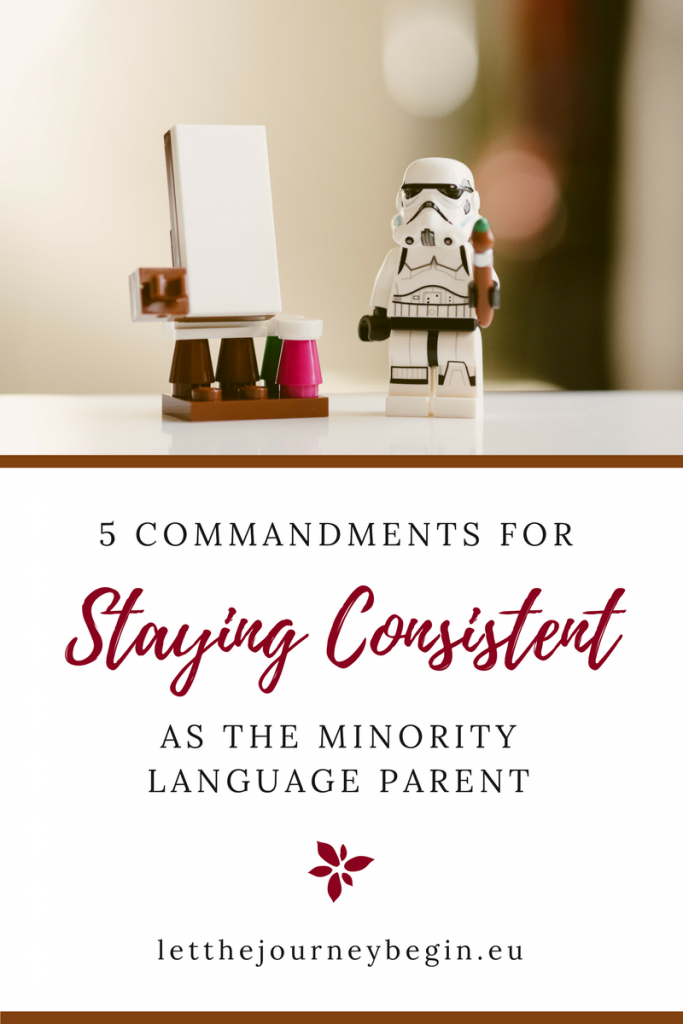“Are you a drop-dead-OPOL-mom?” an acquaintance inquired when I published my last update of Birdy’s language progress. I laughed out loud and then started wondering: am I?
In our family, we follow the OPOL – one parent one language – strategy (you can read all about our approach here). In this constellation, I’m the minority language parent which leaves the responsibility of teaching our kids Latvian chiefly on my shoulders. Most experts seem to agree that consistently using one language is the single most important thing for successfully passing on the family’s minority language(s). At the same time, sticking to their language for 100% in an environment dominated by an another – majority – language is a struggle for many parents.
I’m not claiming to have an answer to this problem (I certainly don’t!) but consistency is not something that I’ve had to struggle with so far. Quite the opposite, using German – our majority language – with the kids feels completely unnatural to me. At the same time, achieving 100% communication in Latvian – our minority language – is not my aim either. I see no problem in singing along to German children’s songs or introducing English words and phrases to my kids.
To be completely honest, half the time I have no clue what exactly I’m doing with this language thing. We just wing it from one day to the next. That said, our 4-year-old is fluent in both German and Latvian (plus is excitedly building her English vocabulary) so we must be doing something right.
A few weeks ago I had the chance to talk with a few Latvian moms here in Germany and many are struggling with the fact that their kids always reply to them in German. This motivated to finally sit down and formulate my approach to being a consistent minority language parent.
Long story short, these are my five commandments!

How to Stay Consistent as the Minority Language Parent
1. Know the Stakes!
Why do you want to pass on your language? Exactly why is this important for you? As Adam from http://bilingualmonkeys.com likes to remind, successfully passing on a minority language is a marathon, not a sprint. For this reason, it is crucial to be clear on your goals and motivation (this book provides a great tool for that).
Personally, my main driver is building close family connections. I want my kids to be able to have close and loving ties with their Latvian grandparents, uncles, cousins, and the rest of the extended family without a language barrier. And there is nothing that brings me more joy than watching my oldest interact with our family, being able to express herself in Latvian with ease.
2. Be Confident!
Once you know why you’re doing it, stick to speaking your language with your kid(s) wherever you go and whomever you’re with. I know many minority language parents struggle with this. They feel self-conscious speaking a foreign language in public transport or at their kid’s school. Often they are afraid to be seen as impolite when together with people who don’t understand the language.
Perhaps I’m simply lucky to be living a big and quite multicultural city, but speaking Latvian absolutely everywhere has never been an issue. If anything, it often works as an ice-breaker for starting a conversation as people are curious about the language. Our German friends know that we speak Latvian and are not bothered by another language at the table. Even a stranger at the playground is generally able to figure out that, e.g., I’m trying to mitigate a conflict between our kids, from my tone and non-verbal cues.
If you’re confident speaking your language, your kids will be as well! Just translate as needed.
3. Repeat, Repeat, Repeat!
The marathon of raising a multilingual child is an exercise in patience and endless repetition. For our youngest this means the “mommy says abc, daddy says xyz” language game (more about it here). For our oldest, who likes to throw in German words in Latvian sentences, it’s more often rephrasing/clarifying/asking a follow-up question using the right Latvian word. I do my best to keep the conversation naturally flowing as opposed to explicit teaching. Of course, after a week of daily reminders that I’m playing “pastnieki” (postmen) as opposed to “post liefern” I might finally get fed up and ask: and how do I say that?!
To be honest, sometimes even I struggle with finding the right word in Latvian. But if the kids don’t learn their Latvian vocabulary from me, who then? So I persevere and refresh my terminology of heavy-duty vehicles and exotic animals.
Patience has never been my strong suit but, as I’ve discovered from this parenting gig, sometimes it’s enough to just be more stubborn than your child. And stubbornness I have in spades.
4. Have a Sense of Humour!
This parenting gig is much easier if you take what comes with lightness and a sense of humour. The same applies to passing on the minority language. Yes, I get annoyed sometimes when Birdy uses a German word with me despite knowing the Latvian one perfectly well. But, just like with your toddler throwing themselves on the ground in the middle of a supermarket, freaking out about it is the least helpful thing you can do. Seeing the funny side of the situation, on the other hand, will make you feel better and might even help to solve the issue faster.
So I try to note the silly mismatches and the humorous expressions. Sometimes I even go along with words that Birdy has created herself because she loves them and finds them funny. (I do make sure that she knows the proper word though!)
I firmly believe that lightness and playfulness are conducive to more successful learning. And I love to observe the joy and pride our daughter expresses learning our three family languages.
5. Be Understanding!
It’s unrealistic to expect that your child will never mix languages and use only minority language vocabulary and grammar when speaking with you. Using more than one language in a sentence or a discussion is known as code-switching and most multilinguals do this. For example, I’m very consistent speaking English with my native English-speaker friend who doesn’t understand any German. With my husband, on the other hand, I often just use the first word that comes to my mind, be it English, German or sometimes even Latvian.
So why should I expect my kids to speak 100% Latvian with me when they know I understand German as well? Furthermore, a lot of the events in their day take place in German and translation is not always an easy task.
Being minority language parents doesn’t mean that we have to live in a minority language bubble. It’s perfectly okay to let a mixed up word slide for the ease of conversation. It’s not a problem to dance and sing along with our kids in another language. Enjoying our time together and building a strong connection is what matters most!
Are you a minority language parent? Are you struggling with staying consistent? Or perhaps you have some great tips to share? Share in the comments below!

Trilingual family: our experience so far
Check out these posts to learn more about our linguistic journey, the kids’ language development and the challenges along the way:
- Birdy’s First Words – the first words that Birdy learned and how deciphering first words in anything but straightforward
- Does she understand German? – that time when the daycare teachers were worried that our 1,5-year-old doesn’t understand enough German
- Birdy Talks: 22 Months – taking stock after the first language explosion
- Birdy Talks: 25 Months – how much difference can 3 months make!
- Birdy Talks: 2 ⅔ Years – before the 3rd birthday language specialisation comes into play
- Birdy Talks: 3,5 Years – the most recent update of our firstborn’s language progress
- Bamm-Bamm Talks: 20 Months – some notes before our youngest one’s language explosion
Raising multilingual kids
Want to know more about raising multilingual kids? These articles will get you started:
- Of “right” and “wrong” languages – should we pretend not to understand our bilingual child if she uses the “wrong” language with either of us?
- Language Learning by Playing – why play is the best way for babies and toddlers to learn a language and develop a rich vocabulary
- Picture Books: Boosting Your Toddler’s Vocabulary – why German “wimmelbooks” are perfect for building vocabulary in all languages
- The Bilingual Toddler – a curated collection of posts from bloggers from across the world about little bi- and multilinguals learning to talk, mixing languages, and more
- Is Bilingual Better? A Look at the Research – are there any cognitive benefits to growing up with more than one language? A look at recent studies
- Multilingual Resources – a roundup of great materials for supporting family languages
